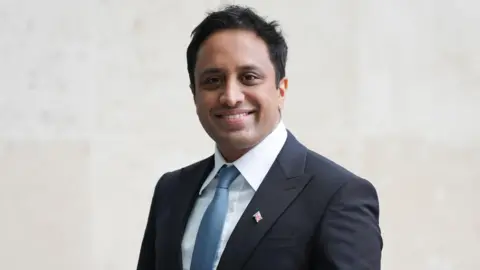In a surprising turn of events, Zia Yusuf, who had recently announced his resignation as chairman of Reform UK, is set to rejoin the party in a newly-defined capacity. Having stepped down just two days ago, Yusuf will now take the lead in what Reform UK has dubbed its “Doge team,” a venture designed to emulate the Department of Government Efficiency established under President Trump during his tenure.
On Thursday, Yusuf articulated his decision to resign, citing that his efforts to facilitate the party’s electoral success no longer constituted “a good use of my time.” Despite this rather abrupt departure, details regarding what prompted such a sentiment remain sparse. However, just a few days later, he is back with the party, indicating a swift change of heart.
Yusuf’s latest role is noteworthy not only for its context but also for the intent behind its establishment. Reform UK’s leader, Nigel Farage, elaborated on Yusuf’s new public-facing responsibilities, stating that Yusuf will be featured more prominently across media platforms. This step is likely to bolster the party’s visibility, particularly in the lead-up to upcoming political engagements and elections.
Farage has been vocal about his support for Yusuf’s return, shedding light on the circumstances that surrounded Yusuf’s resignation. “Zia regrets what he said and did the other day,” Farage noted, emphasizing that the resignation stemmed from a combination of “11 months hard work and exhaustion.” Such remarks suggest that the pressures of political life, particularly in the context of Reform UK’s activities, may have contributed to Yusuf’s earlier discontent.
The newly-formed “Doge team” is positioned as a strategic move by the party, likely aimed at enhancing operational efficiency and promoting more effective governance practices. This initiative reflects a broader trend in contemporary politics where parties attempt to streamline their processes and adapt to the exigencies of modern political campaigning. The comparison to Trump’s department underscores an ambition to implement rigorous efficiency protocols within the party’s operations.
Yusuf’s reappointment, coming almost immediately after his resignation, has sparked various discussions regarding the dynamics within Reform UK. It also raises questions about the nature of internal party unity and how quickly members can shift positions based on changing circumstances or realizations regarding their commitments. Such moments are essential for any political organization, which often relies upon flexibility and adaptability to navigate the tumultuous landscape of public opinion and electoral strategy.
As the narrative unfolds, it remains to be seen how Yusuf will harness his role within the “Doge team” to influence Reform UK’s future trajectory. His return signifies both a personal recalibration and a signal of the party’s determination to maintain momentum in a competitive political climate.
This news is part of the ongoing developments within the party and will continue to evolve. For those interested in following the story, updates will be provided progressively, as new information comes to light. The implications of Yusuf’s renewed involvement could prove significant, not only for him personally but also for the direction and strategy of Reform UK’s political endeavors as a whole.
For additional insights, updates can be accessed through the BBC News App or on social media platforms where breaking news alerts are frequently disseminated. The reported dynamics within Reform UK and the internal adjustments being implemented by its leadership reflect the intricate and often unpredictable realm of political organization and affiliation.



